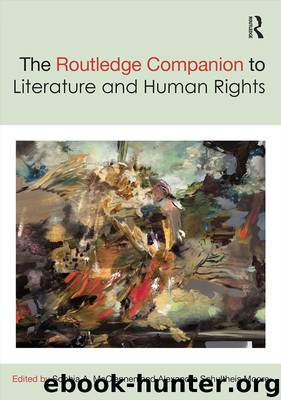The Routledge Companion to Literature and Human Rights by McClennen Sophia A.; Schultheis Moore Alexandra;

Author:McClennen, Sophia A.; Schultheis Moore, Alexandra;
Language: eng
Format: epub
Publisher: Taylor & Francis Group
Published: 2016-03-05T16:00:00+00:00
24
The “Rites of Discovery”
Law and Narrative in the Sixteenth-Century Atlantic World
Ralph Bauer
In 2007, the United Nations General Assembly adopted the long-anticipated Declaration on the Rights of Indigenous Peoples by a vote of 143 to 4. The four countries that voted in opposition of the Declaration were Australia, Canada, New Zealand, and the United States – all of them former British colonies (Miller 2010a: 1). In the case of the United States, this opposition rested on a long legal tradition that reaches back at least to the 1823 Supreme Court case Johnson v. M’Intosh, in which Chief Justice John Marshall ruled that private citizens (in this case, Johnson) could not purchase land from Native American tribes because the title to all Indian lands lawfully belonged to the Federal Government of the United States and that, therefore, the government held the exclusive right of conferring titles on private citizens (in this case, M’Intosh) (Muldoon 2005: 67–82). The government’s title to Indian land, he explained, rested on the principle “that discovery gave title to the government by whose subject, or by whose authority, it was made, against all other European governments, which title might be consummated by possession … . Discovery gave exclusive title to those who made it” (Marshall 1823: 573–74; my emphasis). In elaborating on the connection between “discovery” and “exclusive title” to land, Marshall invoked the examples of the Iberian empires in the Americas:
Spain did not rest her title solely on the grant of the Pope. Her discussions respecting boundary, with France, with Great Britain, and with the United States, all show that she placed it on the rights given by discovery. Portugal sustained her claim to the Brazils by the same title.
(Marshall 1823: 573–74)
Marshall hereby perpetuated a long-standing British-American legal tradition that sought to legitimate the Protestant territorial claims in the Americas vis-à-vis the claims made by other European powers, not vis-à-vis indigenous claims to sovereignty in the New World. As far as indigenous claims to sovereignty go, he presumed that the question had been settled during the early modern period by the Iberian conquests in the New World. He presumed, in other words, that what he called the “doctrine” of Discovery had been enshrined into international law because it had been legitimated by the Iberian conquest (see Muldoon 2005; also Newcomb 2008; Miller 2010b; Robertson 2005).
What got lost in Marshall’s cultural translations was the considerable debate that the question of “Discovery” and the legal claims that could be attached to it had created in early modern Spain. There, in fact, the notion that Native Americans had no legitimate claim to sovereignty based on arguments that they were pagans, barbarians, or savages was far from a fait accompli, and to the extent that Spanish jurists ever articulated a coherent “Doctrine of Discovery,” it was the result of prolonged legal battles that lasted through much of the early modern period. In early modern Spain, the debate that ensued about the Rights of Discovery harked back to the medieval legal commentaries
Download
This site does not store any files on its server. We only index and link to content provided by other sites. Please contact the content providers to delete copyright contents if any and email us, we'll remove relevant links or contents immediately.
| Books & Reading | Comparative Literature |
| Criticism & Theory | Genres & Styles |
| Movements & Periods | Reference |
| Regional & Cultural | Women Authors |
4 3 2 1: A Novel by Paul Auster(12377)
The handmaid's tale by Margaret Atwood(7757)
Giovanni's Room by James Baldwin(7330)
Asking the Right Questions: A Guide to Critical Thinking by M. Neil Browne & Stuart M. Keeley(5761)
Big Magic: Creative Living Beyond Fear by Elizabeth Gilbert(5756)
Ego Is the Enemy by Ryan Holiday(5415)
The Body: A Guide for Occupants by Bill Bryson(5082)
On Writing A Memoir of the Craft by Stephen King(4935)
Ken Follett - World without end by Ken Follett(4723)
Adulting by Kelly Williams Brown(4566)
Bluets by Maggie Nelson(4548)
Eat That Frog! by Brian Tracy(4526)
Guilty Pleasures by Laurell K Hamilton(4439)
The Poetry of Pablo Neruda by Pablo Neruda(4098)
Alive: The Story of the Andes Survivors by Piers Paul Read(4023)
White Noise - A Novel by Don DeLillo(4006)
Fingerprints of the Gods by Graham Hancock(3996)
The Book of Joy by Dalai Lama(3976)
The Bookshop by Penelope Fitzgerald(3844)
